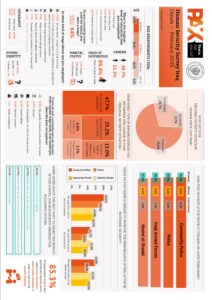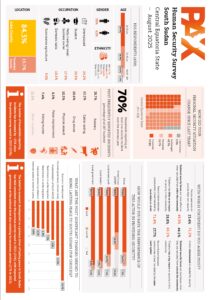Data Validation and Community Security Dialogues in Bor, South Sudan
November 27 – 29, PAX joined with SANSSA and local participants from Jonglei in a three day meeting in Bor, Jonglei to discuss local civilian perceptions of security. In three days, about 40 participants discussed quantitative survey data on local security perceptions, listed and ranked local security threats and discussed practical plans and activities to realistically address these threats. The activities were part of the multi-year project with similar meetings in various states in South Sudan, including in Eastern Lakes, Jubek, Southern Liech and Jonglei.
Data Validation
On the first day, PAX presented the findings of the most recent Human Security Surveys in Jonglei. More than 800 surveys were taken in 2018 across payams in Jonglei. The data discussed, showed an improvement in the overall security in Jonglei according to respondents. By and large, participants were able to corroborate key findings of the survey by sharing their experiences and perceptions. According to participants, the new national peace agreement – the R-ARCSS – signed in September resulted in a major improvement in security. In particular roads have become much safer, especially between Bor and Juba and between Bor and Pibor according to participants.
Having said that, participant concluded that security has not improved for everyone and in all locations equally. In the some payams bordering Murle territories, security actually decreased according to participants. In addition, there has been infighting among some Dinka communities. Female participants said that there was no real improvement in their personal situation within communities. The risk of abduction or assault is still too high to go into the fields or out of village.
In addition, some participants stressed that ‘more secure’ is not the same as ‘sufficiently secure.’ If you live in a community where the proportion of families experiencing some form of violence is 80% in one year and 70% in the next, that‘s a 10% improvement – but it’s still an unacceptably dangerous place to live.
At the same time, participants shared a general hope for the future. Especially cattle raiding seems to have dropped significantly in recent weeks after the local peace agreements were signed. We hope to see this positive development confirmed in our next round of data collection in Jonglei.
Community Security
The day long data validation session served to set the stage for two days of Community Security Dialogue in which participants identified priorities for improving security in their communities and discussed plans to address these priorities. In this Community Security Dialogue, local chiefs; one paramount chief; the Jonglei Community Security Committee; several participants with ties to the local government and a representative from the Civilian Affairs Division of UNMISS focussed on the particular security priorities for Bor South, with help from representatives from Duk and Twic East counties present.
After a day long process of constructive plenary and breakout group discussions on security threats, a list was made of pressing security threats, including cattle raiding; land disputes; child abduction; East Coast Fever; lack of attention for street children; poverty; sexually transmitted deSTDs; poor infrastructure; forced/early marriage; ambushes; suicide; murder; robbery and criminal activities; armed civilians; intercommunal violence; elopement; rape; and poor communication between security actors and communities.
On the second day, the group narrowed down the list to five priority threats that need most attention in the coming months and that can realistically be addressed by Bor South security actors and participants:
Local land disputes
Cattle raiding and child abduction
Intercommunal conflict
Forced marriage
Lack of proper communication between security actors and communities.
The remainder of the day, participants worked to identify practical plans that address each of the five priorities. The resulting list of activities, tools and plans will be taken up by the local Community Security Committee in which local participants are mandated to work on behalf of the entire group on the five identified priorities.
The PAX and SSANSA team (Marieke Meeske, John Malith, Bul Kunjok and Wilbert van der Zeijden) left Bor with a sense that much work was done, much more needs to be done, but also with the conviction that there is reason for hope that communities in Bor South will be able to voice their security concerns in the coming months in a way that leads to sustainable improvements to security for all in the region.
About this news
Date of publication:
Jan 11, 2019

